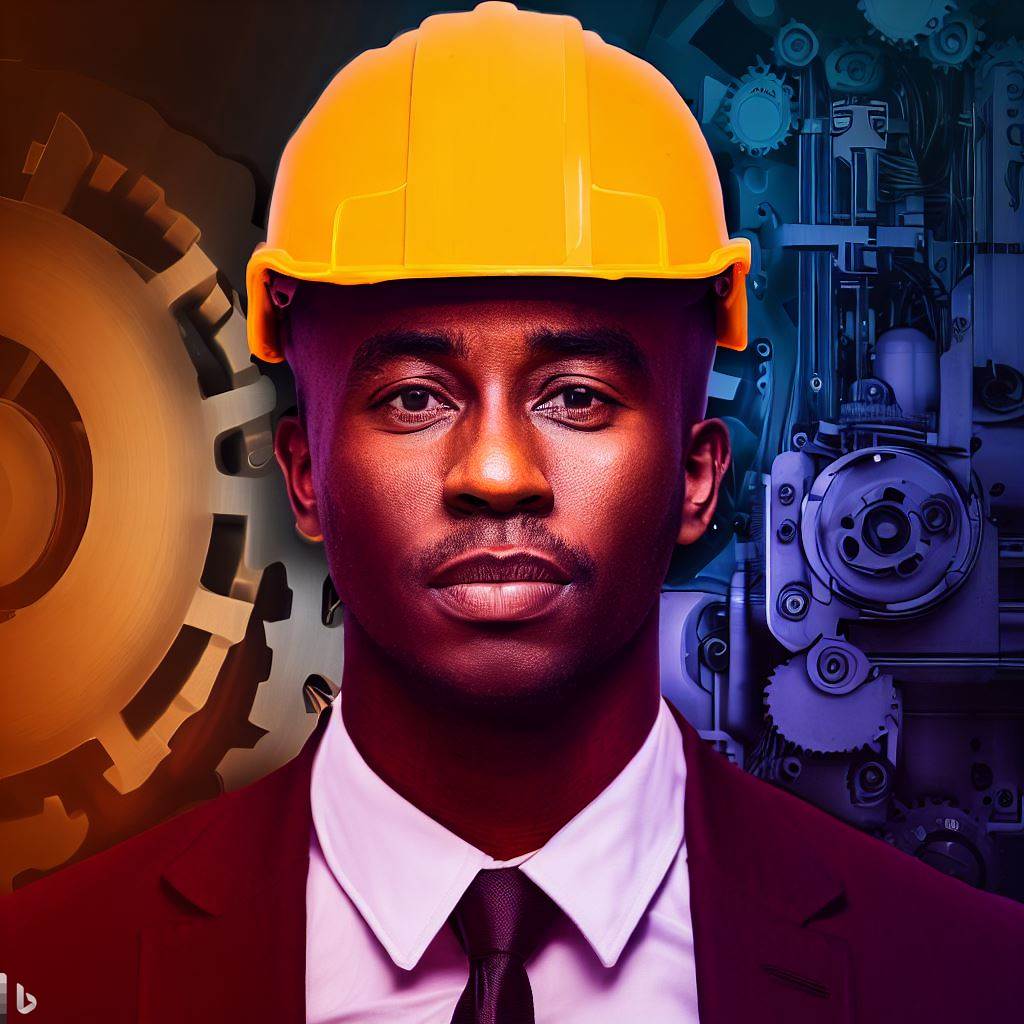Introduction
In this blog post, we will explore the journey of becoming an opto-mechanical engineer in Nigeria. From a student to an opto-mechanical engineer, we will delve into the transformative process.
The purpose of this blog post is to shed light on the challenges and rewards of pursuing this career path in Nigeria. Overview of the transformative path from student to accomplished opto-mechanical engineer.
Inspire aspiring engineers, offering guidance and insights for their successful journey. Embarking on a path to become an opto-mechanical engineer in Nigeria is both challenging and rewarding.
- The initial steps: Nurturing a passion for engineering and embracing the wonders of optics and mechanics.
- Educational pursuits: Choosing the right courses, seeking mentorship, and hands-on learning experiences.
- Overcoming hurdles: Facing academic rigors and persevering through practical projects and assignments.
- Industry exposure: Seeking internships and opportunities to apply theoretical knowledge in real-world settings.
- Career breakthrough: Landing the first job, honing skills, and continuously learning and adapting to advancements.
This blog post aims to motivate and guide young minds, illuminating the fulfilling journey towards becoming an esteemed opto-mechanical engineer in Nigeria.
Background and Education
Importance of education in Nigeria
In Nigeria, education is highly prioritized as it is seen as the key to personal and national development. The government has invested heavily in improving the education system to address the needs of the growing population and prepare the youth for the future.
Writer’s educational background
As a young student growing up in Nigeria, I was fortunate to have access to quality education. I attended primary school, where the foundations of my academic journey were laid. This early education taught me the basics of reading, writing, and mathematics. After completing my primary education, I gained admission into a prestigious secondary school.
Here, I had the opportunity to expand my knowledge in various subjects such as science, mathematics, and literature. The school provided a conducive learning environment and excellent teachers who nurtured my potential. Upon completing my secondary education with outstanding results, I was determined to pursue higher education and specialize in a field that combined my passion for both science and engineering.
Challenges and opportunities faced during the educational journey
Throughout my educational journey, I faced various challenges, but they also presented opportunities for growth and resilience. Limited access to educational resources and infrastructure was a common challenge in Nigeria, especially in rural areas. This often resulted in overcrowded classrooms and a lack of modern teaching facilities.
Nevertheless, despite these challenges, I remained determined to excel academically. I sought out additional resources and engaged in self-study to supplement my classroom learning. This proactive approach helped me overcome the limitations I faced and allowed me to fully grasp the subjects I was studying.
Furthermore, I also had the opportunity to participate in extracurricular activities and competitions that further enhanced my educational experience. These activities not only provided a platform for personal growth but also allowed me to showcase my skills and connect with like-minded individuals. As I progressed through my educational journey, I realized the importance of perseverance and adaptability.
Overcoming challenges and seizing opportunities became crucial elements in shaping my path from being a student to becoming an opto-mechanical engineer in Nigeria.
Read: Opto-Mechanical Engineering: Bridging Theory and Practice in Nigeria
Passion for Opto-Mechanical Engineering
Opto-mechanical engineering is a field that combines optics and mechanics to design and analyze optical systems. It focuses on the interaction of light with mechanical elements. I have always had a deep passion for opto-mechanical engineering. From an early age, I was fascinated by the way light behaves and how it can be manipulated to create amazing things.
The first experience that triggered my interest in opto-mechanical engineering was when I visited an observatory. Seeing the massive telescopes and learning about how they functioned ignited a spark in me. I was captivated by the precision and complexity of the optics involved in capturing and analyzing celestial objects. It was at that moment that I knew I wanted to pursue a career in this field. Another event that further solidified my passion was when I attended a science fair in high school. I stumbled upon a booth showcasing different optical instruments, such as microscopes and cameras.
The engineer manning the booth explained the principles behind these instruments and how they are used in various industries. I was mesmerized by the endless possibilities they presented. The journey from student to opto-mechanical engineer in Nigeria was tough yet rewarding. I conquered obstacles through hard work and perseverance. University laid the foundation, internships and research projects honed my skills. Mentorship and opportunities shaped my growth.
Transform Your Career in Nigeria
Discover unmatched expertise with our personalized Career Consulting service. Navigate Nigeria’s job market with a strategy tailored just for you.
Get StartedDedication led to a job as an engineer. This journey brought pride and fulfillment. Challenges taught adaptability, problem-solving, and teamwork.
Projects emphasized collaboration and perseverance. The experience made me resilient and determined. I am eager to embrace the future. Education and passion transformed my life. Strong foundation and drive enabled success. Invest in education, seek growth. Passion fuels motivation, dedication, innovation. Align career with passion for fulfillment and success.
Read: Continuing Education for Opto-Mechanical Engineers in Nigeria
Pursuing Opto-Mechanical Engineering in Nigeria
Availability of Opto-Mechanical Engineering Programs in Nigeria
Nigeria offers limited but growing opportunities for opto-mechanical engineering programs. Universities like the University of Lagos and Ahmadu Bello University now offer opto-mechanical engineering courses. These programs aim to provide students with a strong foundation in optics and mechanical engineering.
The curriculum includes subjects like geometric and physical optics, image formation, and lens design. Students also learn about materials science, solid mechanics, and computer-aided design (CAD).
Challenges and Opportunities in Pursuing Opto-Mechanical Engineering Field in Nigeria
One major challenge is the limited number of institutions offering opto-mechanical engineering programs. Obtaining admission to these programs can be highly competitive due to the limited availability.
Another challenge is the lack of proper infrastructure and equipment for practical training. Nigeria is still developing its technical resources for opto-mechanical engineering. Despite these challenges, pursuing opto-mechanical engineering in Nigeria also presents unique opportunities. As one of the few experts in this field, engineers have a chance to make a significant impact.
The demand for opto-mechanical engineers is increasing in sectors like telecommunications and manufacturing. Job prospects are promising, and engineers can contribute to the country’s technological growth.
Personal Experiences and Obstacles Encountered During the Journey
Throughout my journey in opto-mechanical engineering, I faced several personal and professional obstacles.
One obstacle was the lack of awareness about the field among peers and even university faculty. Many believed that traditional engineering fields offered more job opportunities. However, I persisted in following my passion for optics and mechanics. Financial constraints were another obstacle, as pursuing this specialized field required additional resources.
I had to work part-time jobs and seek scholarships to fund my education in opto-mechanical engineering. Additionally, limited access to research facilities and equipment posed a significant challenge. I had to be resourceful and creative in finding alternative ways to conduct experiments and projects. Despite these obstacles, my determination and passion for opto-mechanical engineering kept me going. Each hurdle became an opportunity for personal growth and problem-solving skills development.
In review, pursuing opto-mechanical engineering in Nigeria may come with challenges, but it also offers opportunities for personal and professional growth. Limited availability of programs and resources can make the journey difficult, but the demand for opto-mechanical engineers and the chance to contribute to Nigeria’s technological advancement make it worthwhile. My personal experiences have taught me the importance of perseverance and resourcefulness. Through dedication and determination, one can overcome obstacles and achieve success in this field.
Read: Interviews with Leading Opto-Mechanical Engineers in Nigeria
Gaining Practical Experience
The Importance of Practical Experience in the Engineering Field
Practical experience is crucial in the engineering field as it bridges the gap between theory and application.
Your Unique Story, Perfectly Told
Don't let your dream job slip away with a generic resume. We craft personalized resumes and cover letters that highlight your unique strengths, making you unforgettable to Nigerian employers.
Get HiredHands-on experience allows engineers to understand real-world challenges and develop problem-solving skills. It provides an opportunity to apply theoretical knowledge, enhancing technical competence.
Practical experience also helps engineers gain a deeper understanding of engineering principles and concepts.
It enables engineers to learn from mistakes, adapt to different situations, and improve their overall skills.
Writer’s Involvement in Internships, Research Projects, and Other Practical Opportunities
During my journey as a student, I actively sought internships to gain practical experience. I secured an internship at a reputable engineering firm where I worked on real projects.
Additionally, I engaged in research projects conducted by professors, allowing me to further explore my interests.
These practical opportunities exposed me to different aspects of opto-mechanical engineering. I was involved in designing, prototyping, and testing various optical and mechanical systems.
Through these experiences, I learned to work effectively as part of a team and developed valuable communication skills.
Skills and Knowledge Gained from Practical Experiences: A Highlight
Practical experiences significantly enhanced my problem-solving abilities. They allowed me to apply engineering principles in real-life scenarios, improving my technical skills.
I learned to analyze and interpret data obtained from experiments, leading to more accurate conclusions.
My practical experiences also honed my project management skills, enabling me to meet deadlines effectively.
I developed a strong understanding of industry practices and standards through hands-on involvement.
These experiences exposed me to the complexities of opto-mechanical engineering, expanding my knowledge base.
Read: International Exposure for Nigerian Flight Engineers

Overcoming Challenges
Challenges Faced Throughout the Journey
- The lack of access to quality educational resources hindered my progress.
- Limited funding and financial constraints made it difficult to pursue engineering studies.
- The societal bias against female engineers posed additional challenges as a woman in the field.
- Inadequate infrastructure and outdated equipment affected practical learning opportunities.
- The scarcity of job opportunities in the engineering sector added to the uncertainties.
- Keeping up with the fast pace of technological advancements demanded continuous learning.
Strategies to Overcome Challenges
- Utilizing online platforms and open educational resources to compensate for lack of materials.
- Exploring scholarship opportunities and seeking financial aid from organizations supporting education.
- Building a support network to counteract the societal bias against women in STEM fields.
- Taking initiatives to collaborate with companies or organizations to access better lab facilities.
- Expanding the job search and considering internships to gain practical experience and increase chances of employment.
- Actively engaging in workshops, seminars, and online courses to stay updated with industry advancements.
Advice for Students and Aspiring Engineers
For students or aspiring engineers facing similar obstacles, here are some key pieces of advice:
Transform Your LinkedIn Presence
Don't let your LinkedIn profile blend into the crowd. We uniquely craft profiles that showcase your professional story, making Nigerian recruiters take notice like never before.
Stand Out- Never underestimate the power of self-learning and resourcefulness. Take advantage of online platforms and open educational resources.
- Seek financial aid opportunities and scholarships, as there are organizations keen on supporting deserving students.
- Remember that your gender does not define your capabilities. Surround yourself with empowering individuals and mentors.
- Network and seek collaborations to access better infrastructure and practical learning opportunities.
- Don’t limit yourself to traditional job search methods. Explore internships and engage in experiential learning.
- Stay curious, be adaptable, and embrace continuous learning to keep up with the ever-evolving field of engineering.
Overall, the journey from a student to an opto-mechanical engineer in Nigeria is not without its challenges.
However, by utilizing available resources, seeking support, and adopting a proactive approach, these obstacles can be overcome. With determination and perseverance, aspiring engineers can navigate through the hurdles and succeed in their chosen path.
Achievements and Career Path
Writer’s Achievements as an Opto-Mechanical Engineer
- Successfully designed and implemented optical systems for various industrial applications.
- Developed innovative solutions to improve the efficiency and performance of opto-mechanical devices.
- Received recognition for outstanding problem-solving skills and attention to detail.
- Published research papers in reputable journals, contributing to the field of opto-mechanical engineering.
- Presented findings at international conferences, showcasing expertise and establishing professional networks.
Career Path After Completing Education
After completing my education, I embarked on a challenging and rewarding journey in the field of opto-mechanical engineering in Nigeria.
Armed with a strong academic foundation, I started my career as a junior engineer at a renowned optics company. Through diligent work and continuous learning, I quickly gained practical experience in designing and developing opto-mechanical devices. This hands-on experience helped me refine my skills and deepen my understanding of the field. As I honed my expertise, I took on more responsibilities and gradually advanced to higher positions within the company. I embraced leadership roles, managing teams of engineers and collaborating with cross-functional departments to deliver successful projects.
Simultaneously, I pursued professional development opportunities, attending workshops and training programs to stay updated with the latest technological advancements in opto-mechanical engineering. This commitment to personal growth accelerated my career trajectory.
After several years of professional experience, I was promoted to the position of Opto-Mechanical Engineer, overseeing critical projects and providing technical guidance to junior engineers. This milestone marked a significant achievement in my career as I became responsible for imparting knowledge and nurturing the next generation of engineers.
Notable Projects, Contributions, and Organizations the Writer is Involved With
- Contributed to the design and development of a high-resolution imaging system used in medical diagnostics.
- Collaborated with a team of engineers to enhance the performance of laser cutting machines for industrial applications.
- Played a key role in the development of a remote sensing device used in environmental monitoring.
- Currently involved in an innovative project aiming to design an advanced opto-mechanical system for space exploration.
- Active member of the Optics and Photonics Society of Nigeria, participating in knowledge-sharing activities and organizing technical conferences.
Throughout my career, I have strived to make a meaningful impact in the field of opto-mechanical engineering. I am constantly seeking opportunities to contribute to cutting-edge projects and leverage my expertise to drive innovation. As I continue on this exciting journey, I remain committed to pushing the boundaries of what is possible in my profession.
Conclusion
My journey to becoming an opto-mechanical engineer in Nigeria was challenging yet rewarding. I overcame obstacles through perseverance and hard work, excelling in university engineering studies. Practical experience through internships and research projects honed my skills. Mentorship and opportunities were pivotal in shaping my growth. With continuous learning, I secured my position.
The journey brings pride and fulfillment. Challenges and experiences were essential learning opportunities. Each hurdle made me a better engineer. Problem-solving, adaptability, and teamwork are vital in engineering. Projects taught collaboration and perseverance.
The journey made me resilient and determined. The future holds exciting possibilities. Education and passion are transformative forces. Pursue dreams with a strong foundation. Drive and dedication lead to success. Invest in education and seek growth. Passion fuels motivation and innovation. Aligned careers bring fulfillment and success. My journey exemplifies the power of education and passion.




